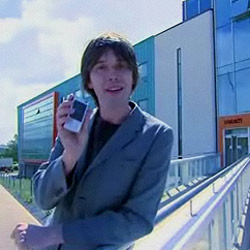Recent Stories
- Businesses urged to tap into science and technology young talent
- Digital relay baton enables remote crowd cheering of athletes
- Health Innovation Campus moves a step closer
- £7.1 million R&D boost for North West businesses
- Centre of excellence created for the next industrial revolution
- Artificial intelligence toolkit spots new child sexual abuse media online
- Strategic partnership set to help plug cyber security skills gap
- What your choice of smartphone says about you
- InfoLabTree: Discover the Story
- novi.digital Launch Event - 'An Event to Help Businesses Grow Online'
RSS Feeds
RSS feeds can deliver the latest InfoLab21 news and events direct to your browser without you having to visit the website.
In most browsers you can click on an RSS link and choose to subscribe to the feed to add it to your favourites or bookmarks.
InfoLab21 Features On BBC1
 Prof. Brian Cox Presenting From InfoLab21
Prof. Brian Cox Presenting From InfoLab21
InfoLab21 featured on BBC Northwest Tonight on Tuesday 15th July as part of a series on Science and Technology in the region.
Presenter Prof. Brian Cox came to InfoLab21 last month with a BBC film crew to interview Prof. Alan Dix and Dr. Joe Finney from the Department of Computing and Dr. Paul Coulton from the Department of Communication Systems about their current research projects.
The five minute segment entitled "Computers Big and Small" was shown as part of a series called Tomorrow's World Today, running over 4 weeks on BBC1's regional news programme Northwest Tonight.
Computing Department's Prof. Alan Dix and Dr. Joe Finney were seen talking about 'Project Firefly!' their application which has been described as 'fairy lights with a technological upgrade'. Each individual light contains a miniature computer, making them individually controllable. As a result, patterns and effects are much easier to create and can be far more intricate and dynamic than those currently available.
Dr. Finney described how as technology advanced and computers got even smaller it may one day be possible to 'paint' a TV screen onto any wall and send data to all the individual computers contained in the paint, which would then make up the TV screen.
Prof. Cox then spoke to Dr. Paul Coulton from the Communications Department who demonstrated his latest mobile phone game, recently in the top five gaming videos of the day on YouTube.
Dr. Coulton went on to explain how mobiles could soon be able to superimpose informative graphics over camera images enabling the user to 'see' information such as Wi-Fi hotspots or clouds of pollution based on available data.
The programme can be viewed on the BBC website via the link below.
Mon 21 July 2008



